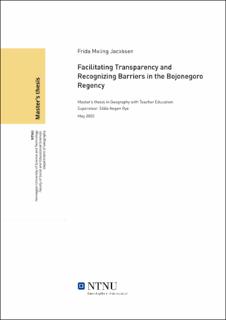| dc.contributor.advisor | Rye, Ståle Angen | |
| dc.contributor.author | Jacobsen, Frida Meling | |
| dc.date.accessioned | 2021-09-28T17:54:00Z | |
| dc.date.available | 2021-09-28T17:54:00Z | |
| dc.date.issued | 2020 | |
| dc.identifier | no.ntnu:inspera:56114696:5696933 | |
| dc.identifier.uri | https://hdl.handle.net/11250/2785183 | |
| dc.description.abstract | Denne mastergradsoppgaven søker å svare på følgende forskningsspørsmål: Hvordan forstår og fasiliterer ikke-statlige organisasjoner og lokale ledere gjennomsiktighet (transparency) på lokalt nivå i Bojonegoro, og; hvilke faktorer begrenser fordelene av gjennomsiktighet? For å svare på disse spørsmålene, har det blitt anvendt kvalitativ metode. Mer spesifikt har de anvendte metodene bestått av intervju, deltakende observasjon og en hybrid av disse under feltarbeid i byen Bojonegoro, og landsbyene som omringer olje- og gass-feltet.
Indonesia er medlem av EITI (Extractive Industry Transparency Initiative), har iverksatt en FOI-lov (Freedom of Information), og mer spesifikt har Bojonegoro blitt en pilotkommune for OGP (Open Government Partnership). Alle disse initiativene krever at statlige institusjoner er åpne om administreringen og bruken av inntekter knyttet til utvinning av naturressurser. I tillegg har Bojonegoro besluttet at disse lovene om å offentlig publisere informasjon også gjelder områder som helse og sikkerhet, miljørisiko, bedriftsansvar og samfunnsutvikling. Ved siden av kommunens fokus på gjennomsiktighet, finnes det også store olje- og gassressurser i området. Dette gjør Bojonegoro spesielt egnet for å se på virkningene og praktiseringen av disse gjennomsiktighetsinitiativene i forbindelse med utvinning av naturressurser.
På tross av at Bojonegoro har store inntekter i forbindelse med naturressursene sine, er det fortsatt utbredt fattigdom i kommunen. I tillegg har det blir rapportert om korrupsjon. Denne studien ønsker å finne ut om fraværet av de positive effektene knyttet til gjennomsiktighetsinitiativene kan knyttes til måten gjennomsiktighet blir forstått og praktisert på, eller hvorvidt det skyldes andre kontekstuelle faktorer. Ettersom ulike forskere har foreslått ulike betingelser som må oppfylles for at gjennomsiktighet skal ha noen effekt, vil informantenes forståelse sammenlignes med disse. Informantene består av aktivister fra ikke-statlige organisasjoner, landsbyledere og en lokal, uformell maktholder.
En stegvis deduktiv-induktiv metode har blitt brukt for å analysere dataene. Viktige nøkkelbegreper i denne avhandlingen er ansvarlighet, myndiggjøring, deltakelse, korrupsjon og kunnskapsmekler. Målet har ikke vært å skape typiskhet eller representativitet, men heller gi en detaljert og subjektiv redegjørelse gjennom informantenes persepsjoner og historier. Studien avslører at hvordan informantene forstår gjennomsiktighet, har liten innvirkning på hvordan denne gjennomsiktigheten fremmes. Videre finner studien både mangler i forhold til omfanget av gjennomsiktighet og kontekstuelle forhold som påvirker effekten av gjennomsiktighet i Bojonegoro. | |
| dc.description.abstract | This thesis has sought to answer the following research questions; How does NGOs and local leaders understand and facilitate transparency on the local level in Bojonegoro regency; and; which barriers lessens the benefits of transparency? These questions have been sought answered using a qualitative methodology. More specifically, the interview, the walk-along interview, and participatory observation has been used to gather data during fieldwork in the city of Bojonegoro and villages surrounding oil and gas field.
Indonesia is a compliant country to the Extractive Industry Transparency Initiative, have adopted a Freedom of Information law, and more specifically, the Bojonegoro regency has become a pilot regency for the Open Government Partnership. All these initiatives oblige governmental institutions to be open about the management and use of revenues coming from the extractive industries. In addition, in the Bojonegoro regency, these laws also encompass health and safety issues, environmental risk and impacts, corporate responsibility and community development. Aside from the regents focus on transparency, a large part of the Cepu Block – an area with huge oil and gas reserves – is found here. This makes the Bojonegoro regency especially suitable for investigating the impacts and practicalities of transparency initiatives regarding extractive natural resources.
Despite huge revenues originating from the natural resources in the Bojonegoro regency, the poverty remains pervasive and allegations of corruption and mismanagement has been reported. This study investigates whether the lack of outcomes envisioned in the ‘transparency narrative’ in the Bojonegoro regency are caused by how transparency is understood and facilitated, or whether it is caused by other contextual factors. As several scholars proposes different contingencies for transparency to have an effect, the informants understandings are subjected to a comparison to these contingencies. Activists from NGOs, village leaders, and a local informal powerholder have been selected as informants. The goal has been to identify what happens when internationally formulated initiatives are implemented at the local level.
A stepwise deductive-inductive method has been applied to analyze the data. Key terms in the following thesis, despite transparency and different forms and approaches towards transparency, are accountability, empowerment, participation, corruption, and knowledge broker. The aim has not been to generate typicality or representativeness, but rather give a detailed and subjective account through the informants’ perceptions and stories. The study reveals that how informants understand transparency have little influence regarding how transparency is facilitated. Furthermore, the findings reveal that both limitations regarding the scope of transparency and contextual factors act as barriers towards transparency in the Bojonegoro regency. | |
| dc.language | | |
| dc.publisher | NTNU | |
| dc.title | Facilitating Transparency and Recognizing Barriers in the Bojonegoro Regency | |
| dc.type | Master thesis | |
